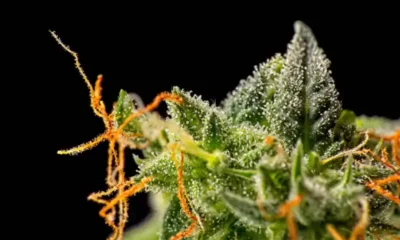Connect with us
Published
1 year agoon

Tennessee’s hemp industry is about to look a bit different… The state’s General Assembly passed a hemp-related bill, House Bill 403 and its companion Senate Bill 378, which will regulate the production, distribution and sale of products with hemp-derived cannabinoids, Benzinga reports. The bill now heads to Governor Bill Lee’s (R) desk for his signature.
The bill includes cannabinoids like delta-8 and delta-10 THC, which can be derived from hemp and can still get consumers high.
The passage was due, in part, to a partnership between House Majority Leader William Lamberth (R), Sen. Richard Briggs (R) and cannabis industry nonprofit Cultivate Tennessee, along with chairman of the Senate State & Local committee and a number of supportive state representatives.
One of the major aims behind the bill is keeping consumers safe, through licensing, packaging and disclaimer requirements.
“The industry pushed for these regulations in order to demonstrate that it is solidly on the side of safety and accountability,” said Cultivate Tennessee Co-chair Devin Aracena. “The only way for us to grow this industry and educate Tennessee consumers is to create an environment where trust and consumer confidence is paramount. We think this bill is an incredible first step in the next phase of the industry in the state.”
The bill specifically establishes a “privilege tax” of 6% of the sales price of products, with revenue going to the state general fund; deems that manufacturers and sellers must obtain licensure through the Department of Agriculture; and mandates that hemp-based cannabinoid products must be tested for safety and toxicity by an accredited laboratory.
The new regulations also create child-resistant “effectiveness standards” for cannabinoid products, specifically requiring label warnings, disclaimers and one-year expiration dates for all products. The bill also introduces new offenses to selling to or assisting someone under 21 with purchasing hemp-derived cannabinoid products, and the Department of Agriculture will enforce the provisions and report annuals to the general assembly.
Jason Pickle, co-founder of Volunteer Botanicals and board member of Cultivate Tennessee, called the bill a “huge step forward” for Tennessee, adding that it will help to “define the industry” by creating safety, accountability and consumer protection guardrails.
“The common-sense requirements of this new bill will ensure that Tennessee residents and resellers can feel comfortable with the safety and efficacy of hemp-derived products, as well as in the responsibility of the companies that produce them,” Pickle said. “This will help tremendously with the growth of the industry. This bill creates a legal framework to operate and distribute products.”
Tennessee is the most recent state to enact regulations on the hemp industry, which has remained largely unregulated after the 2018 Farm Bill legalized hemp production. Namely, the emergence of hemp-derived psychoactive cannabinoid products has sparked a movement to rein the industry in, with some states banning hemp-derived cannabinoids like delta-8 altogether.
The new bill’s approval also comes months after the U.S. Department of Agriculture Partnerships for Climate-Smart Commodities awarded nearly $5 million in grant money to Tennessee State University, the Hemp Alliance of Tennessee, the University of Tennessee and the Tennessee Department of Agriculture. The funding will go toward research and development of new economic opportunities for Tennessee’s hemp industry.
“Tennessee can become the leading producer of hemp in the Southeast United States,” said Hemp Alliance of Tennessee President Frederick Cawthon at the time. “We are committed to growing this industry responsibly, and we encourage all industries to examine how they can utilize this climate-smart and regenerative raw material.”
Agriculture Commissioner Charlie Hatcher, D.V.M. echoed the sentiment, hoping the grant money would keep agriculture as Tennessee’s top industry.
“We join [these partners] in efforts that aid in discovering new uses of industrial hemp and boost farming opportunities in rural areas. Tennessee is eager to increase support of new and existing hemp producers through this USDA grant award,” Hatcher said.


Despite City Efforts, Hemp Shops Posing as Dispensaries Prevail in Las Vegas


Cannabis Community, Investors React to DEA Decision To Reschedule


Georgia Governor Signs Bill Establishing Licensing Requirements To Grow Hemp


Study: Psilocybin Enhances Meditation


Ohio GOP Lawmakers Debate Adult-Use MJ Priorities, Eye June for Regulation Approval


Taylor Swift Puts Narcotics Into All of Her Songs on ‘The Tortured Poets Department’
